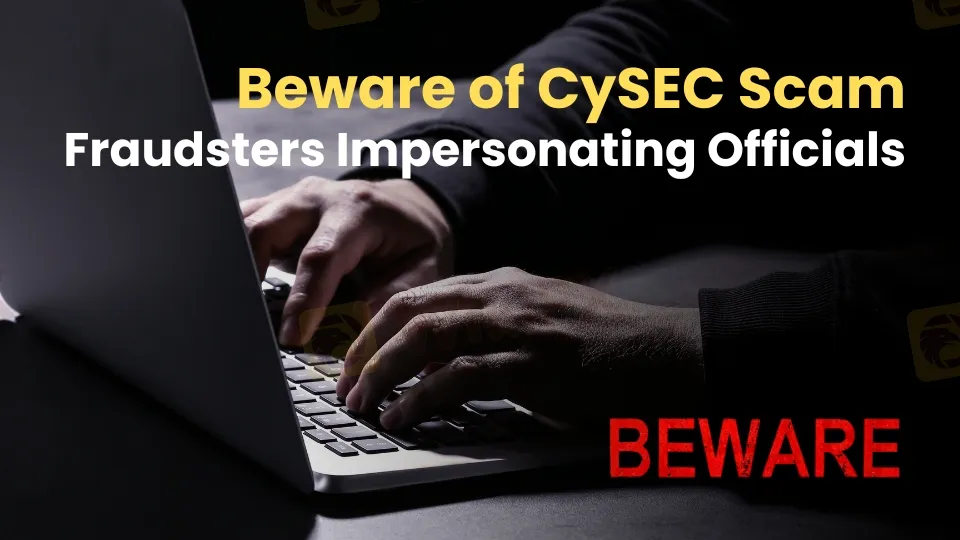简体中文
繁體中文
English
Pусский
日本語
ภาษาไทย
Tiếng Việt
Bahasa Indonesia
Español
हिन्दी
Filippiiniläinen
Français
Deutsch
Português
Türkçe
한국어
العربية
Beware of CySEC Scam: Fraudsters Impersonating Officials
Abstract:CySEC warns investors of scams involving fraudsters impersonating officials and using fake websites to deceive traders. Learn how to stay safe from investment fraud.

The Cyprus Securities and Exchange Commission (CySEC) is sounding the alarm again as cunning fraudsters step up their game, impersonating its officials to prey on unsuspecting investors. These scammers, masquerading as CySEC representatives, are reaching out—mostly through email—to trick traders with promises of recovering lost funds, only to demand fake fees in return. It‘s a scheme that’s growing more polished and harder to spot, leaving investors vulnerable.
The regulator has also uncovered a troubling rise in clone websites—crafty replicas designed to mimic official CySEC platforms. These fraudulent sites blend real company details with fabricated data, creating an illusion of legitimacy thats convincing enough to fool even cautious investors. The goal? To lure people into sharing sensitive information or handing over money under false pretenses.
In its latest public warning, CySEC laid out the scammers playbook:
- These imposters often pose as CySEC officers, legal advisors, or even other regulators, flashing official-looking logos, stamps, and forged signatures to build trust.
- Their targets? Clients of CySEC-regulated firms are contacted via emails or phone calls that seem authentic at first glance.
- They dangle offers of compensation from shady brokers—especially in forex and CFD trading—only to pivot to extracting personal details for more sinister schemes once victims bite.

CySEC is urging everyone to stay sharp and double-check any communication claiming to come from them. “If it feels off, report it,” the regulator advises, encouraging people to reach out directly to CySEC or local authorities to flag suspicious activity. Its a simple step that could save you from a costly mistake.
Under existing rules, CySEC can‘t force online platforms to shut down these financial scams outright, but it can push for fraudulent ads to be taken down once they’re spotted. This gap has let scammers keep peddling high-risk schemes, often flaunting fake CySEC licensing to reel in victims. Its a persistent headache for the regulator—and a growing risk for the public.
This isn‘t a new fight for CySEC. Just last year, they called out a fake Instagram account, “cysec_cy”, where scammers posed as officials to con investors with bogus fee demands tied to compensation claims. The regulator is crystal clear: they don’t cold-call, send random messages, or ask for your personal or financial info out of the blue. Real CySEC emails always end in “gov.cy”—anything else is a red flag.
These fraudsters often prey on those already burned by failed investments, especially in speculative online trading. Their pitch might sound like a lifeline, but it‘s a trap. Stay wary, verify everything, and don’t let smooth-talking scammers make a bad situation worse.

Disclaimer:
The views in this article only represent the author's personal views, and do not constitute investment advice on this platform. This platform does not guarantee the accuracy, completeness and timeliness of the information in the article, and will not be liable for any loss caused by the use of or reliance on the information in the article.
Read more

RM650,000 Lost in Investment Fraud Advertised on Social Media
A Malaysian manager has suffered a devastating financial loss of RM651,800 after falling prey to a deceptive investment scheme via a Facebook advertisement that promised lucrative returns within a short timeframe.

Quantedge Capital Co. Limited: The Fake Platform Behind a RM703,000 Loss
A woman from Kuantan lost RM703,000 after falling for an investment scam linked to a platform called Quantedge Capital Co. Limited. The 47-year-old company manager believed she was investing in a legitimate opportunity shared with her through WhatsApp. Over the course of ten months, she transferred large sums of money but never received any returns.

Scam Alert: Retired Teacher Loses RM700,000 to Stocks Qs Secure
A 69-year-old retired teacher and part-time contractor has lost more than RM700,000 after falling victim to an online investment scam advertised on Google.

Will Stablecoin Legislation Force Tether to Abandon USDT in the U.S.
Tether CEO Paolo Ardoino discusses stablecoin legislation, USDT’s U.S. ban potential, and a new U.S.-compliant stablecoin amid regulatory shifts.
WikiFX Broker
Latest News
Global Panic Builds as Forex Shifts into Risk-Off Mode
Shocking! Oil Prices Plunge Below $60
BI Alerts Filipinos: Telegram, Facebook Used for Trafficking Scams
AUD/USD Hits New Lows as Panic Selling Unfolds Amid Robust U.S. Jobs Report
SEC Fines Velox Clearing $500,000 for SAR Failures
How to protect your money during Black Monday
FCA Released New List of Unauthorized Brokers
Singapore Authorities Warned Against WeChat, UnionPay, Alipay Impersonation Scams
Deepfake Scams Nearly Drain $499K from Business
The Rising Trend: Why Forex Brokers Are Investing in Sports?
Currency Calculator







